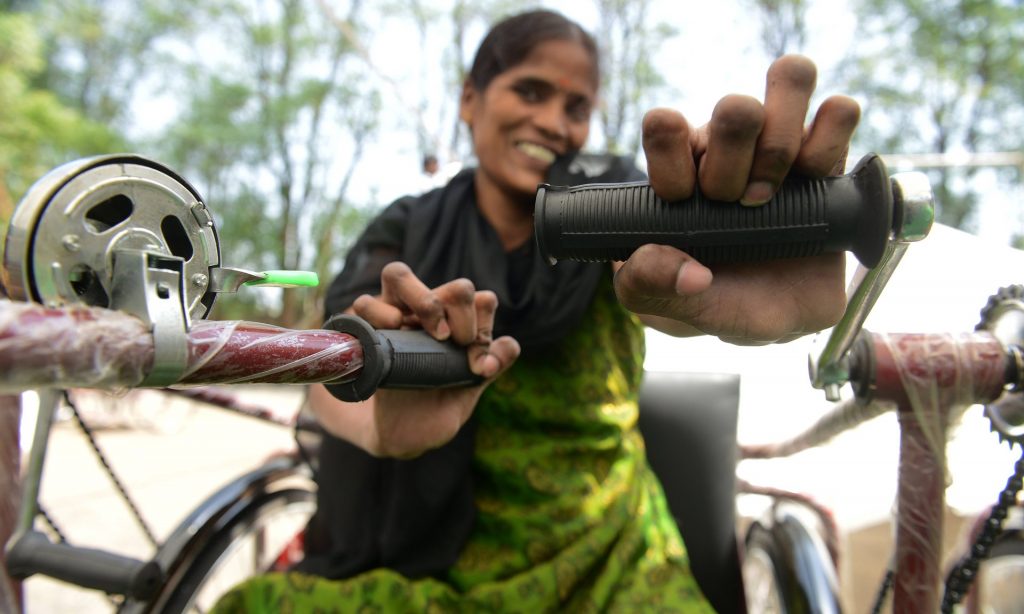
Photograph: Noah Seelam/AFP/Getty
Civil law in Pakistan permits men to have up to four wives but Noori, a visually impaired woman, married into a family where the preference is for one. Nonetheless, Noori’s husband remarried because she had a disability.
Kasturi, an Indian girl with polio, wants to marry but her mother believes no one will have her because she will probably be unable to take care of the house.
Women with disabilities make up 19% of the world’s population, yet many are not considered “woman enough”. Their capability is questioned – can she cook? can she raise children? – along with their sexuality and entitlement to equity or rights. If they fail to meet idealised expectations about how a woman’s body should look, they are deemed incapable of providing care.
Sadly, this view of women with disabilities being “broken” or of less value has been adopted by the women’s rights movement, which has been slow to make space for them – if not actively resistant.
This is hard to understand. Women with disabilities could be the fulcrum of the women’s rights movement. The challenges they face surrounding identity, beauty and duty of care are all issues firmly on the women’s rights agenda.
A female friend said recently over lunch: “Thank God for the technology which screens disabled foetuses – it is so easy to get rid of them.” When I objected, I was told it is a woman’s choice whether she “wants a disabled kid”. It is interesting how the discourse of choice and agency is perceived when it intertwines with disability.
In countries that allow abortion, disability is often deemed justification for the process. This has put women’s and reproductive rights movements at loggerheads with disability rights groups. The former claim women have the right to make a choice. The latter say such abortions are an exercise in eugenics, reasserting the myths and perpetuating stigma surrounding people with disabilities.
Instead of working to create structural and systemic support, such as access to education, employment and public spaces, and reducing barriers for disabled people and their families, the approach is to prevent the birth of children with disabilities in the first place.
Consequently, health and women’s rights activists find it extremely difficult when a virus like Zika surfaces, because we are bombarded with messages about the “devastating” impact of foetal abnormalities, instead of talking about better support. It is a shame foetuses with disabilities are used by the pro-choice groups to open up discussion about abortion rights, while also being used by pro-life groups to push their agenda of expanding abortion bans – a political game in which disability rights lose.
Unfortunately, women with disabilities are often unable to exercise their bodily, reproductive and childcare rights. In a famous case in India, a woman with a learning disability was raped, became pregnant and wanted to have the baby. But the legal system opposed her right to make that choice. Only disability rights activists fought for her.
In Colombia, the constitutional courts (pdf) ruled that girls with disabilities could be forcibly sterilised, arguing they lacked the mental capacity to make reproductive decisions or protect themselves from unwanted pregnancy arising from sexual abuse. There was little concern for protecting them from abuse in the first place.
If an able-bodied woman were subject to forced abortions, sterilisation, separation from her babies, it would be contested, protested and fought by the women’s rights movement, wouldn’t it?
Women with disabilities elicit greater support from the women’s rights movement for the issues they face – particularly those surrounding sexual and reproductive rights – than they do from the male-dominated disability rights movement.
But more needs to be done. Opening up spaces in the women’s movement for women with disabilities is all well and good, but the mainstream and the marginalised must be fused to form a united women’s rights movement. We have to become one to ensure no woman is left behind.
• Nidhi Goyal is a Mumbai-based activist, trainer, and researcher working on disability rights and gender justice. She is visually impaired. She will be attending Awid’s 13th forum in Bahia, Brazil, from 8-11 September 2016. Awid partners with the Guardian on its women’s rights and gender equality coverage

